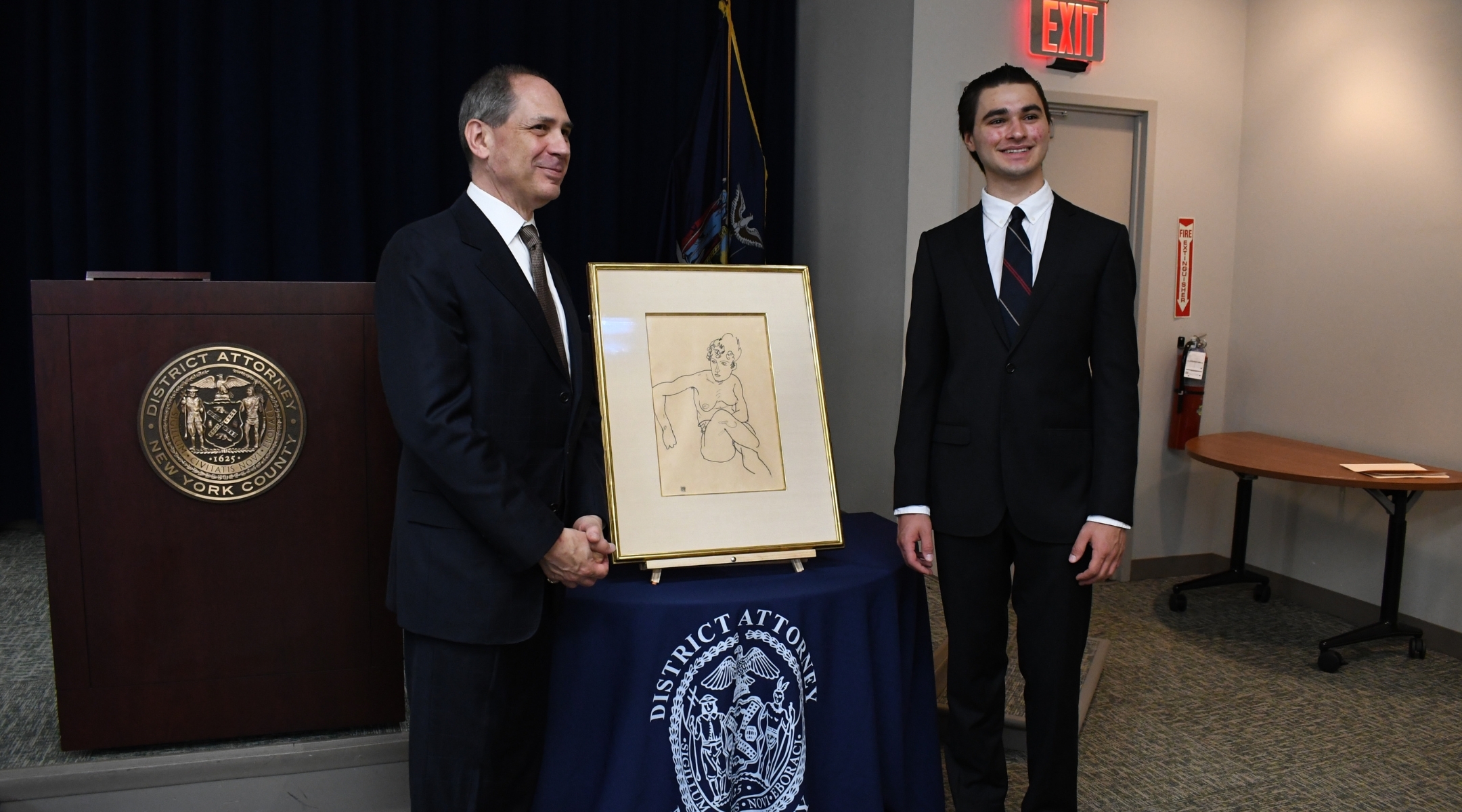
Timothy Reif and son Paul Reif pose in front of “Seated Nude Woman, front view,” an Egon Schiele drawing stolen by the Nazis from the private collection of their ancestor, Fritz Grünbaum. (Jackie Hajdenberg)
(JTA) — On Friday, for the third time since September, Timothy Reif found himself standing in the New York District Attorney’s Office to accept a modernist drawing that the Nazis looted from his family.
With him in the room was a relative of another family that survived the Nazis and that — in an unusual twist on Holocaust restitution efforts — were the owners of the stolen artwork. Unlike museums and collectors that have fought in court to retain possession of Nazi-looted art, both families on Friday were gratified to see the drawing return to its rightful heirs.
“In one of the darkest moments in the history of the world, everything ended,” Reif told JTA after the handoff occurred. “There is a moral center of gravity, there is an ethical sense, and a religious sense, and there is generosity coming out of something that was fundamentally evil. So for that to happen is incredible.”
Reif and his relatives have spent countless hours over the decades fighting in court to recover the vast art collection that once belonged to their ancestor, the Viennese Jewish cabaret performer Fritz Grünbaum. Recently, they’ve found success, repossessing 11 works by Austrian expressionist Egon Schiele from museums and private collections across the country.
The Schiele drawing at the center of Friday’s ceremony — “Seated Nude Woman, front view” — had until recently been hanging in the home of Jewish economist Gustav Fritz Papanek, who was born in Austria in 1926 and did not know the work was stolen. The tortuous path it took from Grünbaum via the Nazis to Papanek, and now back to Grünbaum’s descendants, reflects the complexities that persist in the saga of Nazi-looted art nearly eight decades after the end of the Holocaust.
“We believe that returning the drawing is the right thing to do,” Papanek’s family said in a statement. “We are fortunate that our family … were able to enjoy viewing this work of art on a daily basis. The experience of the two families serves as yet another reminder of the evil and brutality of the Nazi regime.”
The drawing is thought to be of Schiele’s wife Edith and was completed in 1918. The Nazis branded Schiele’s work, like that of many other Jewish and modernist artists, as “degenerate” and counter to Nazi ideology. In 1938, the regime confiscated Grünbaum’s art collection, which included some 400 works, including the Schiele pieces. Grünbaum and his wife were later murdered in the Holocaust.
Adolf Hitler’s personal art curator was authorized to sell off seized degenerate artwork, including pieces owned by Grünbaum. By 1956, most of Grünbaum’s collection was in a Swiss auction house whose owner forged provenance papers for some of the stolen works and claimed to have obtained them legally. They were then sold to Otto Kallir, a Jewish art dealer in New York who traded in Nazi-looted art.
Papanek’s parents, both prominent psychologists, fled Austria for France and then the United States, always staying narrowly one step ahead of the encroaching Nazis, from whom they saved hundreds of children while operating a refuge in France. They bought “Seated Nude Woman” in 1961 and gave it to Papanek in 1969, thinking it had been purchased legitimately.
The family kept the Schiele hanging in their living room for many years. When she was ill and bedridden, Papanek’s wife Hanna had the drawing moved to her bedroom.
Evidence of the theft came to light only in September 2022, when Papanek died. The drawing went through an appraisal process that uncovered evidence of falsified provenance papers. The Papanek family then contacted Grünbaum’s descendants, including Reif.
“The history behind Nazi-looted art is horrific and tragic, and the consequences are still impacting victims and their families to this day,” Manhattan District Attorney Alvin Bragg, who has worked to restitute the Schiele works, said in a statement. “It is inspiring to see both the Grünbaum and Papanek families join together to reflect on their shared history and preserve the legacy of Fritz Grünbaum.”
Bragg added, “I also want to thank the Papanek family for their willingness to fully cooperate throughout this entire investigation, and to the attorneys and analysts in our Antiquities Trafficking Unit for their tireless commitment to returning these artworks.”
Reif and his family will auction the work for charity through Christie’s auction house, and the proceeds will go to support young artists. Though he had attended similar handoff ceremonies twice before, Reif still looked at the drawing with reverence, and proudly posed for pictures in front of it with his son.
Reif and the Papanek family both spoke about the harm perpetrated by the Nazis across generations — and how gratified they were, after so many years, to have righted this wrong.
“One thing is we’re grateful that Gus and Hanna were not aware of any of this, and that they enjoyed this piece of art in their home for the, I don’t know, 40 years that it was in their house, and they took great pleasure,” a relative of the Papanek family, Rocco Orlando, told JTA. “And so I’m glad they didn’t have to deal with yet one more reminder of their history.”

We’re building on 127 years of independent journalism to help you develop deeper connections to what it means to be Jewish today.
With so much at stake for the Jewish people right now — war, rising antisemitism, a high-stakes U.S. presidential election — American Jews depend on the Forward’s perspective, integrity and courage.
— Jodi Rudoren, Editor-in-Chief










